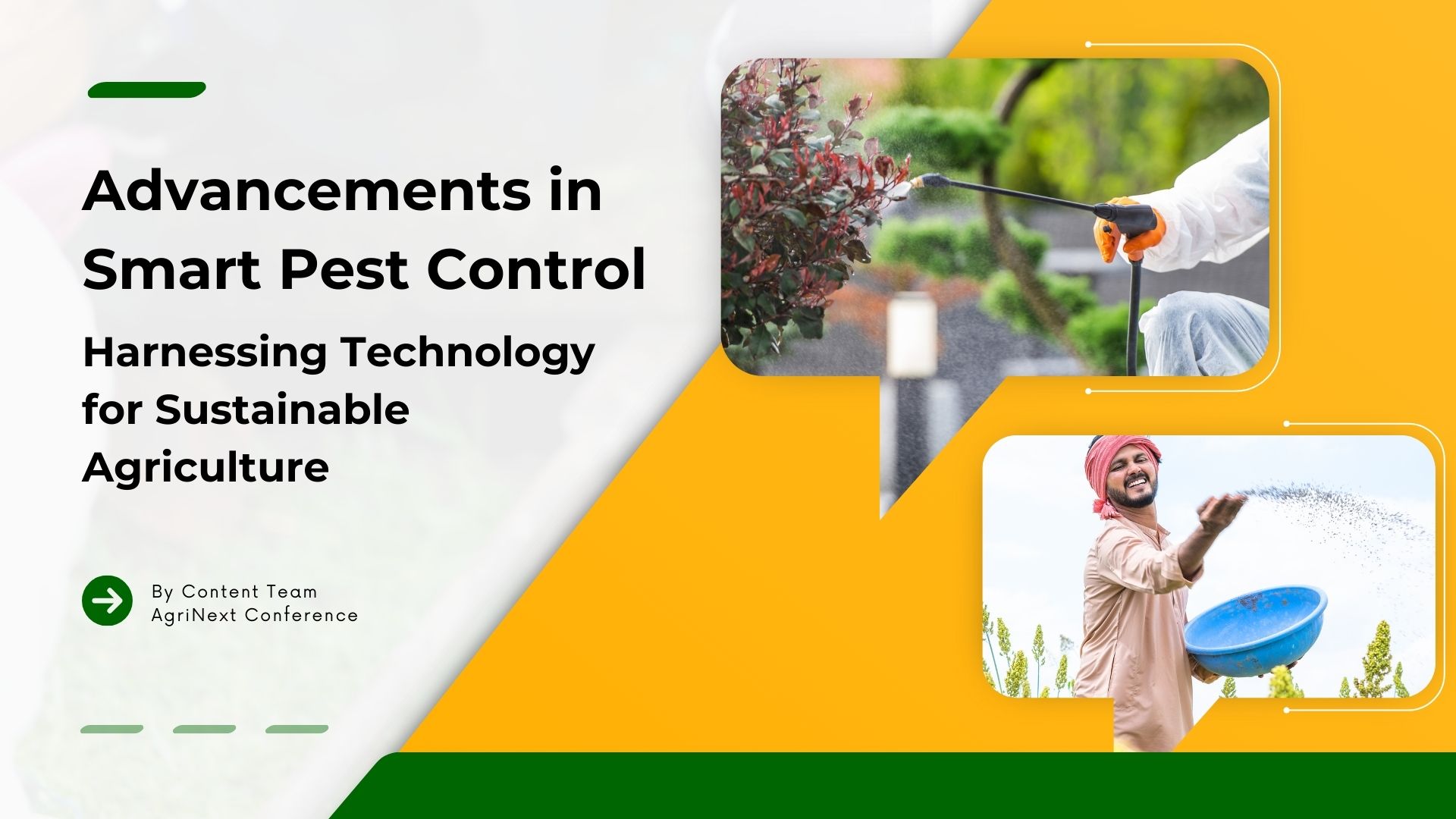
“Smart pest control isn’t just about killing pests; it’s about managing them in a way that maintains ecological balance and promotes sustainable agriculture.”
Dr. Jules Silverman, Entomologist
Smart Technologies for Sustainable Agriculture
In recent years, the agricultural industry has witnessed a paradigm shift in pest control strategies, driven by advancements in technology and a growing emphasis on sustainability. Traditional pest management methods, such as indiscriminate pesticide application, have raised concerns about environmental damage, pesticide resistance, and human health risks. In response, farmers and researchers are increasingly turning to smart pest control solutions that leverage cutting-edge technologies to target pests more effectively while minimizing negative impacts on the environment and human health.
Table of Contents
Smart Pest Control
One of the key pillars of smart pest control is the integration of data-driven decision-making through the use of sensors, drones, and artificial intelligence (AI). These technologies enable farmers to monitor pest populations in real-time, detect pest outbreaks early, and implement precise interventions.
Sensors deployed in fields collect data on environmental conditions, crop health, and pest activity. For example, temperature and humidity sensors can provide insights into favorable conditions for pest breeding, while plant health sensors can detect signs of stress caused by pest infestations. This data is then analyzed using AI algorithms to identify patterns and predict pest outbreaks before they escalate.

Drones and Biocontrol
Drones equipped with high-resolution cameras and multispectral sensors offer another valuable tool for smart pest control. These drones can survey large agricultural areas rapidly, capturing detailed images of crops and identifying areas of pest infestation or crop damage. AI-powered image recognition algorithms analyze these images to distinguish between healthy plants and pest-affected ones, enabling targeted treatment strategies.
One innovative approach to smart pest control is the use of biocontrol agents, such as beneficial insects or microbial pesticides, in combination with precision targeting technologies. For example, drones equipped with micro-sprayers can deliver biopesticides directly to pest-infested areas, minimizing off-target effects and reducing the overall quantity of pesticides used.
Integrated Pest Management
Furthermore, the concept of integrated pest management (IPM) lies at the heart of smart pest control strategies. IPM combines multiple pest control tactics, including cultural practices, biological control, and chemical interventions, to maintain pest populations below economically damaging levels while minimizing risks to human health and the environment. Technology serves as a powerful enabler of IPM by providing farmers with the data and tools needed to implement integrated pest management practices effectively.
Cost Savings and Environmental Protection
The adoption of smart pest control technologies offers several benefits for farmers and the environment. By targeting pests more precisely, farmers can reduce the amount of pesticides used, leading to cost savings and lower environmental impact. Moreover, by minimizing pesticide exposure, smart pest control strategies help preserve beneficial insects, soil health, and biodiversity, contributing to a more sustainable agricultural ecosystem.
The AgriNext Awards ,Conference and Expo Empowering the Next Generation of Agripreneurs:
- The AgriNext Awards,Conference and Expo inspires and empowers the next generation of agripreneurs and agricultural innovators.
- By showcasing success stories and providing platforms for young innovators to present their ideas, the event nurtures creativity, entrepreneurship, and leadership in agriculture.
- Workshops, mentoring sessions, and networking opportunities offered at the conference equip aspiring agripreneurs with the tools, resources, and connections needed to turn their ideas into reality.
“Sowing Sustainability: The Significance of Climate-Smart Agriculture. Climate-smart agriculture offers a triple win: it boosts productivity, enhances resilience, and reduces greenhouse gas emissions. It’s a win for farmers, a win for the environment, and a win for future generations.”
Kanayo F. Nwanze, Former President of the International Fund for Agricultural Development (IFAD)
Climate smart agriculture is a crucial approach aimed at addressing the challenges posed by climate change while ensuring food security, enhancing resilience, and promoting sustainable development. The importance and impact of climate-smart agriculture can be understood through several key points:
Resilience to Climate Change
CSA practices are designed to help farmers adapt to changing climatic conditions, such as erratic rainfall, increased temperatures, and extreme weather events. By implementing techniques like drought-resistant crop varieties, soil conservation measures, and water management strategies, farmers can better withstand the impacts of climate change and maintain productivity.
Food Security
Climate change threatens global food security by affecting crop yields, disrupting supply chains, and increasing the prevalence of pests and diseases. CSA focuses on improving agricultural productivity and efficiency in a sustainable manner, thereby ensuring that farmers can continue to produce enough food to feed growing populations, even in the face of climate-related challenges.
Sustainability
CSA practices promote environmentally sustainable agricultural systems by minimizing greenhouse gas emissions, conserving natural resources, and preserving biodiversity. For example, agroforestry techniques that integrate trees with crops help sequester carbon, improve soil fertility, and enhance ecosystem resilience.
Adaptation and Mitigation
Climate-smart agriculture combines both adaptation and mitigation strategies to address the dual challenges of climate change. Adaptation measures help farmers cope with the impacts of climate change, while mitigation efforts aim to reduce greenhouse gas emissions from agriculture through practices like agroecology, conservation agriculture, and renewable energy adoption.
Economic Benefits
CSA practices can lead to increased farm profitability and income stability for farmers. For instance, improved water management techniques not only conserve water resources but also enhance crop yields and farm incomes. Additionally, diversification of crops and income sources can reduce farmers’ vulnerability to climate-related risks.
Resilience of Rural Communities
Climate-smart agriculture contributes to the resilience of rural communities by strengthening their capacity to cope with climate shocks and stresses. By empowering farmers with knowledge, resources, and support, CSA helps build more resilient livelihoods and reduces dependency on external aid during times of crisis.
Global Climate Change Mitigation
Agriculture is a significant contributor to greenhouse gas emissions, primarily through deforestation, methane from livestock, and nitrogen fertilizer use.
Methane is a potent greenhouse gas, with a much higher global warming potential than carbon dioxide over a 20-year timeframe.
Traditionally, rice cultivation involves flooding paddies to suppress weed growth and provide optimal conditions for rice growth. This flooding creates the anaerobic environment conducive to methane production.
As a result, methane emissions from rice farming contribute significantly to the warming of the atmosphere and climate change.Various mitigation strategies have been developed to reduce methane emissions from rice paddies while maintaining productivity. These include alternate wetting and drying (AWD) techniques, which involve periodic drying and re-flooding of paddies, as well as aerobic rice cultivation methods that minimize water use.
Researchers are also exploring innovative approaches such as the use of methane inhibitors, biochar amendments, and microbial treatments to reduce methane emissions from rice paddies without compromising crop yields.
By adopting climate-smart practices that reduce emissions and enhance carbon sequestration, agriculture can play a vital role in global efforts to mitigate climate change. Overall, climate-smart agriculture is essential for ensuring the sustainability, resilience, and productivity of agricultural systems in the face of climate change. By promoting adaptation, mitigation, and sustainability, CSA offers a pathway towards a more secure and resilient food future for all.
“Climate-smart agriculture is not a silver bullet, but it’s an essential part of the ammunition in the fight against hunger, poverty, and climate change.”
José Graziano da Silva, Former Director-General of the Food and Agriculture Organization (FAO)
AgriNext Awards and Conference
As the agricultural sector continues to evolve and adapt to new challenges and opportunities, initiatives like the AgriNext Awards, Conference & Expo play a vital role in driving innovation, collaboration, and sustainability. By celebrating groundbreaking innovations, fostering knowledge exchange, and empowering the next generation of agricultural leaders, the event serves as a catalyst for positive change in the industry. As we look forward to the upcoming AgriNext Awards,Conference & Expo let us celebrate the spirit of innovation that propels agriculture toward a brighter, more sustainable future.
Conclusion
Smart pest control represents a promising approach to addressing the challenges associated with pest management in agriculture. By harnessing the power of technology, farmers can achieve effective pest control while reducing reliance on conventional pesticides and promoting environmental sustainability. As smart pest control continues to evolve and integrate with other agricultural practices, it holds the potential to revolutionize pest management and pave the way towards a more resilient and sustainable agricultural future.
Signup For AgriNext Conference Newsletter

